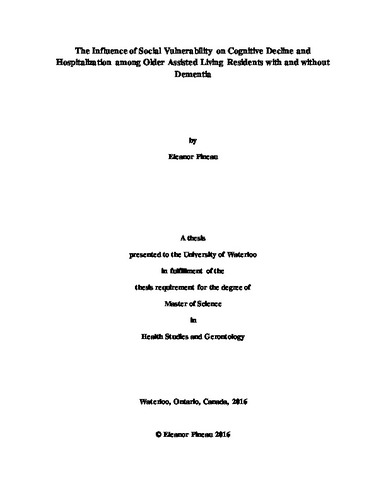| dc.description.abstract | Background: Concerns regarding social vulnerability have been reported among various populations including community-dwelling older adults, long-term care residents, and assisted living (AL) residents. Social vulnerability has been defined in numerous ways and has been associated with various adverse health outcomes such as cognitive decline, mortality, frailty, and morbidity. AL facilities are a relatively new care setting for older adults. AL facilities differ from long-term care facilities mainly in their staffing level and mix, and in their social model of care that promotes autonomy, independence, and dignity in a home-like environment. AL facilities are emerging as a popular residential option for older persons with and without dementia who require some level of care, both in the United States and Canada. Social vulnerability in AL facilities may be present and linked to adverse health outcomes, but remains relatively unexplored from a Canadian and dementia perspective. Understanding the influence of social vulnerability on cognitive decline and hospitalization among older AL residents with and without dementia is crucial to those residents’ wellbeing and quality of life.
Objectives: This investigation used secondary data from the Alberta Continuing Care Epidemiological Studies (ACCES), a prospective study of 1,089 older (65+ years) designated assisted living (DAL) residents in Alberta, Canada. Clinical and functional data from ACCES were linked with provincial administrative health data in order to address two objectives: (1) To estimate the prevalence and correlates of social vulnerability in DAL residents overall, and stratified by dementia status; and (2) To examine the associations between baseline social vulnerability and subsequent health outcomes over one year, including cognitive decline and first-event hospitalization among DAL residents overall, and stratified by dementia status.
Methods: A total of 1,089 residents (from 59 DAL facilities) were included as participants (mean age 84.4±7.3; 77% female). Baseline (2006-2008) and one year follow-up assessments of resident characteristics were obtained by trained research nurses using the interRAI-AL assessment tool. Facility-level data were obtained using administrator interviews. Hospitalization events were obtained through linkage with provincial health service utilization data from the Alberta Inpatient Discharge Abstract Database. Social vulnerability was used as the exposure of interest. A social vulnerability index (SVI) was created by aggregating multiple variables from the interRAI-AL assessment tool. A SVI score was assigned to each resident and was then categorized as low, intermediate, or high social vulnerability based on the distribution in the overall sample. Cognitive decline was the first main outcome. Change in the Cognitive Performance Scale (CPS) score (derived from items on the interRAI-AL assessment) from baseline to one year follow-up was used to determine cognitive decline. Time to first-event hospitalization was the second primary outcome and was ascertained through linkage of interRAI-AL data with the Alberta Inpatient Discharge Abstract Database. Generalized estimating equations with a logit link were used to estimate odds ratios of cognitive decline associated with social vulnerability, adjusting for relevant confounding factors. Multivariable Cox proportional hazards models were used to estimate the risk of first-event hospitalization associated with social vulnerability. All models were further stratified by residents’ dementia status at baseline.
Results: Among DAL residents, 42.5% experienced cognitive decline (among the sub-sample of n=889 that survived to follow-up), and 38.7% experienced hospitalization as their first event (among the sub-sample of n=1,066 with linked data) during the one year follow-up. The distribution of low, intermediate and high social vulnerability among the overall cohort was 33.4%, 31.2%, and 35.4% respectively. Those with dementia were significantly more likely than those without dementia to experience greater severity of social vulnerability. In the dementia subgroup, the distribution of low, intermediate, and high social vulnerability was 25.2%, 28.9%, and 45.9% respectively, whereas in the non-dementia subgroup, it was 44.6%, 34.4% and 21.0% respectively. In general, social vulnerability was significantly positively associated with age, fatigue, depressive symptoms, health instability, cognitive and functional impairment, bladder and bowel incontinence, and number of emergency department visits in the past 90 days. Social vulnerability was also significantly associated with health region, although no discernable pattern was present.
Residents with intermediate or high social vulnerability levels (compared to low social vulnerability) showed a significantly higher risk for cognitive decline during follow-up (adj. OR=1.48, 95% CI 1.08-2.02 and adj. OR=1.74, 95% CI 1.18-2.56, respectively). Among the dementia subgroup, only those with intermediate social vulnerability showed a significantly increased risk for cognitive decline compared to those with low social vulnerability (adj. OR=1.92; 95% CI: 1.26-2.93). Among the non-dementia subgroup, only those with high social vulnerability showed a significantly increased risk for cognitive decline compared to those with low social vulnerability (adj. OR=2.01; 95% CI: 1.02-3.97).
Residents with high social vulnerability (compared with low social vulnerability), were at significantly increased risk of first-event hospitalization over one year (adj. HR=1.25; 95% CI: 1.02-1.52). A similar increased risk of first-event hospitalization was observed for those with relatively high social vulnerability (compared with low social vulnerability) among the dementia subgroup, adj. HR=1.46; 95% CI: 1.05-2.05). Among the non-dementia subgroup, social vulnerability was not found to be a statistically significant predictor of first-event hospitalization.
Conclusion: These findings suggest that social vulnerability may influence cognitive decline and first-event hospitalization among DAL residents overall and DAL residents with and without dementia. Particular attention should be paid to DAL residents with dementia as the presence of dementia seems to put residents at greater risk for social vulnerability and its associated outcomes. Clinical- and policy-level interventions in DAL may prevent and treat social vulnerability which may reduce associated cognitive decline and hospitalizations among its residents. Greater focus on individualized social programming in DAL facilities may serve to improve the social health status of its vulnerable residents. Further intervention research in this area is warranted. | en |

